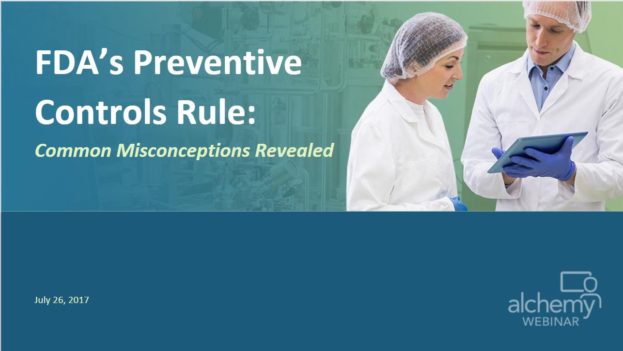FDA is full-speed ahead with rolling out the Food Safety Modernization Act (commonly referred to as “FSMA”). With FSMA, FDA seeks to overhaul the U.S. regime for food safety – from a regime that reacted to safety outbreaks to one that seeks to preventive them. A key pillar in this preventive model is the Hazard Analysis and Risk-based Preventive Controls Rule (HARPC or PCR). This rule requires food facilities to develop and implement Food Safety Plans that control for food safety hazards. FDA staggered the compliance dates for this regulation; however, the “large” companies had to start complying almost a year ago (August 2016).
Since the first compliance date for HARPC, FDA has been silent about any enforcement activities.
This is not surprising – notably the first Warning Letter for Dietary Supplement cGMPs did not occur until almost two years after the first compliance date. “However, FDA’s silence should not be interpreted as non-action by the Agency,” cautions John F. Johnson.
FDA’s Program Realignment
Rather FDA has been hard at work implementing Program Realignment, which took effect in May 2017. FDA’s Program Realignment is larger than FSMA and concerns reorganizing FDA’s field operations (frontline inspection and enforcement staff) from generalists who handle all FDA commodities into specialist groups that handle just one commodity (such as just foods). This allows the FDA staff to become more familiar with the unique aspects of the commodity.
Mr. Johnson explains, “This specialist expertise is essential for implementing FSMA”. First, HARPC requires the industry to conduct hazard analyses and then implement appropriate controls for those hazards. FDA must have the knowledge and expertise to analyze and critique a facility’s decisions. Second, FDA intends to enforce FSMA through more real-time compliance decisions – as compared to conducting an inspection and not raising issues until weeks or months later. Under the new FSMA approach, FDA desires to make certain compliance decisions during the inspection and/or issue a “deficiency letter” within days of the inspection.
Thus to accomplish FDA’s goals for FSMA compliance and enforcement, FDA needs a highly trained front-line staff that specializes in the food regulations, policies, and science. FDA’s Program Realignment provides a firm foundation for FDA to build this new inspection and compliance corps for enforcing FSMA.
Learn more about the Preventive Control Rule:
On Wednesday July 26th attorney John F. Johnson of FDAImports and industry veteran Holly Mockus of Alchemy Academy will be hosting a FREE Webinar titled “FDA’s Preventive Controls Rule: Common Misconceptions Revealed.” The webinar will follow their expertise on how companies can fully comply with the changes made under FSMA in the past year.
For more insight into how these policies will and have already impacted your company and information about things to come, contact us today, 410-220-2800.


